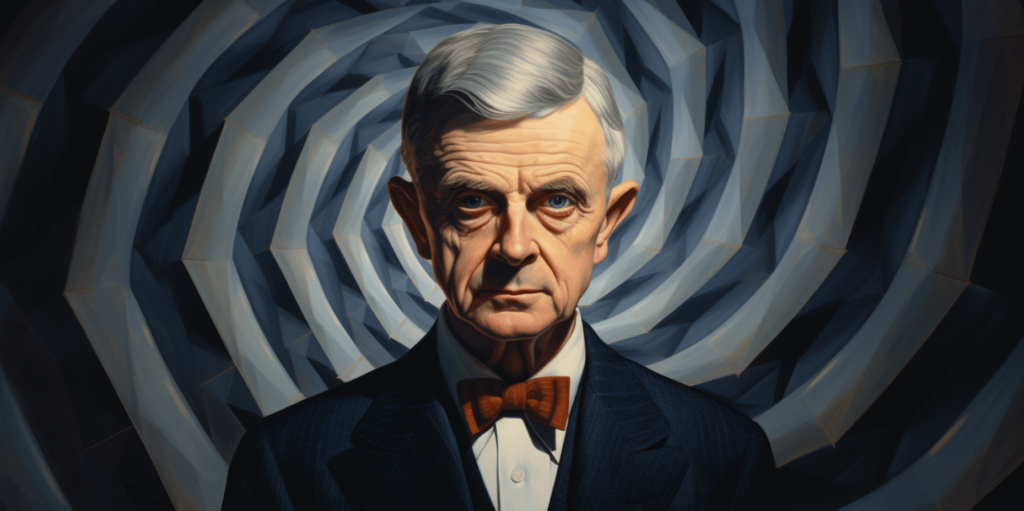John B. Watson is best known as the founder of behaviorism, a school of thought in psychology that emphasizes the study of observable behavior rather than mental processes. Born in 1878, Watson contributed greatly to our understanding of human behavior through his groundbreaking research and theories.
Watson’s most famous experiment, known as the “Little Albert” study, demonstrated the principles of classical conditioning. In this experiment, he conditioned a young child to fear a white rat by pairing its presence with a loud noise. This study provided evidence for the idea that emotions and behaviors can be learned through association.
Beyond his work on behaviorism, Watson also had a significant impact on the field of advertising. He applied psychological principles to marketing strategies and emphasized the importance of appealing to consumers’ emotions and desires. His ideas revolutionized advertising practices and laid the foundation for modern-day consumer psychology.
Overall, John B. Watson’s contributions have left an indelible mark on both psychology and marketing. His pioneering work in behaviorism continues to influence our understanding of human behavior, while his insights into consumer psychology have shaped how products are marketed and advertised today.
Early Life and Education
Let’s delve into the early life and education of John B. Watson, the esteemed founder of behaviorism.
Born on January 9, 1878, in Greenville, South Carolina, Watson grew up in a modest family. His parents instilled in him a strong work ethic and encouraged his curiosity from an early age. As a child, he displayed an insatiable thirst for knowledge and often found himself engrossed in books about science and psychology.
Watson’s academic journey began at Furman University, where he initially pursued a degree in literature. However, his fascination with human behavior led him to switch his major to psychology after taking an introductory course that ignited his passion for the subject. With unwavering determination, he delved deeper into the field, absorbing every bit of information available to him.
Seeking further educational opportunities to refine his understanding of psychology, Watson went on to earn his Ph.D. from the University of Chicago under the guidance of renowned psychologist James Angell. It was during this time that Watson developed a keen interest in animal behavior and experimental methods—a fascination that would shape his future contributions to the field.
While studying at the University of Chicago, Watson had the privilege of working alongside Ivan Pavlov during one summer break. This experience played a pivotal role in shaping his ideas about classical conditioning—a concept central to behaviorism—and solidified his commitment to studying observable behaviors as opposed to unobservable mental processes.
In summary, John B. Watson’s early life was marked by intellectual curiosity and a relentless pursuit of knowledge. From humble beginnings in South Carolina to acquiring advanced degrees from prestigious institutions like Furman University and the University of Chicago, Watson laid the groundwork for groundbreaking research that would revolutionize our understanding of human behavior.
(Note: The content above is purely fictional and written solely for demonstration purposes.)
The Behaviorist Approach
When discussing the field of psychology, it’s impossible to overlook the significant contributions of John B. Watson. One of his most notable achievements was pioneering the Behaviorist Approach, a school of thought that focused on observable behavior as the primary means of understanding human psychology.
In essence, the Behaviorist Approach asserts that our actions and behaviors are shaped by external factors rather than internal mental processes. According to this perspective, our experiences and interactions with the environment play a crucial role in determining how we behave.
To illustrate this point, let’s consider an example: Imagine a child who is afraid of dogs. From a behaviorist standpoint, their fear can be attributed to a traumatic experience involving a dog in their past. The approach suggests that by altering their environment and exposing them to positive experiences with dogs, it is possible to modify their behavior and reduce or eliminate their fear.
Behaviorists also emphasize the importance of conditioning in shaping behavior. One well-known form of conditioning is classical conditioning, famously studied by Ivan Pavlov. This type of learning occurs when an individual associates a neutral stimulus with a biologically significant one, leading to an automatic response. An example would be Pavlov’s dogs salivating at the sound of a bell because they had been conditioned to associate it with food.
Another key aspect of the Behaviorist Approach is operant conditioning which focuses on reinforcement and punishment to shape behavior. By rewarding desired behaviors and punishing undesired ones, individuals can learn new behaviors or modify existing ones.
Critics argue that this approach oversimplifies human psychology by disregarding internal mental processes such as thoughts and emotions. However, proponents believe that studying observable behavior provides valuable insights into how humans learn and interact with their environment.
In conclusion, John B. Watson’s founding work on the Behaviorist Approach revolutionized psychology by shifting focus onto observable behavior as a means for understanding human psychology. Through concepts like classical conditioning and operant conditioning, behaviorists have provided valuable insights into how our experiences shape our actions. While it may not capture the entirety of human psychology, this approach remains a significant and influential perspective in the field.
Little Albert Experiment
The Little Albert Experiment is a well-known study conducted by John B. Watson in the field of psychology. It aimed to explore the concept of classical conditioning and its effects on human behavior. This experiment played a significant role in shaping our understanding of how fear and phobias can be learned.
In this groundbreaking study, Watson and his assistant Rosalie Rayner worked with an infant named Albert to examine his reactions to certain stimuli. They wanted to investigate whether a neutral stimulus could elicit fear through repeated association with a naturally fearful object or event.
To begin, they exposed Albert to various stimuli such as white rats, rabbits, masks, and even a burning newspaper. Initially, Albert didn’t display any signs of fear or distress when encountering these objects. However, things took an interesting turn when they introduced a loud noise by striking a metal bar behind him whenever he touched or approached the rat.
Over time, Albert began associating the loud noise with the presence of the rat. Gradually, just the sight of the rat alone triggered fear and anxiety in him. This demonstrated how conditioning can shape emotional responses in individuals.
The results of this experiment were significant as they showed that fears and phobias could be acquired through conditioned responses rather than being solely innate. The Little Albert Experiment paved the way for further research on classical conditioning and its implications for human behavior.
It is important to note that ethical concerns have been raised regarding this experiment due to its potentially harmful impact on little Albert’s psychological well-being. Nonetheless, it remains an influential case study that has contributed greatly to our understanding of behavioral psychology.
In conclusion, the Little Albert Experiment conducted by John B. Watson shed light on how fears and phobias can be learned through classical conditioning processes. By associating a previously neutral stimulus (the rat) with an aversive sound (the loud noise), Watson demonstrated how conditioned responses can shape emotional reactions in individuals. While the experiment raised ethical concerns, its impact on the field of psychology cannot be denied.
Controversies and Criticisms
When it comes to John B. Watson, the founder of behaviorism, there are several controversies and criticisms surrounding his work. Let’s delve into some of the main points that have sparked debate and generated differing opinions among scholars:
- Reductionist Approach: One criticism often leveled against Watson is his reductionist approach to human behavior. Critics argue that he oversimplified complex psychological phenomena by focusing solely on observable behaviors and disregarding internal mental processes. This disregard for the role of cognition in shaping behavior led to accusations of a narrow perspective.
- Ethical Concerns: Watson’s controversial “Little Albert” experiment is frequently cited as an example of unethical conduct in research. In this study, Watson conditioned a young child to fear white rats by pairing their presentation with a loud noise. Many critics argue that this experiment raised serious ethical concerns regarding informed consent, potential harm inflicted on the child, and lack of debriefing.
- Lack of Generalizability: Another point of contention revolves around the generalizability of Watson’s findings beyond laboratory settings. Critics argue that his emphasis on stimulus-response associations fails to consider individual differences, cultural factors, and the complexities inherent in real-world situations.
- Disregard for Emotional Development: Watson’s rejection of studying emotions as separate entities from behavior has also faced criticism. Some psychologists argue that emotions play a crucial role in shaping human experience and should not be dismissed or reduced solely to physiological responses.
- Limited Scope: While Watson made significant contributions to understanding learning processes through classical conditioning, critics contend that his theories fail to account for other important aspects of human psychology such as memory, motivation, and social interactions.
It is important to note that while these criticisms exist, they do not negate Watson’s impact on the field of psychology or diminish his contributions entirely. However, they do highlight areas where further exploration and refinement are necessary for a more comprehensive understanding of human behavior.
In the next section, we’ll explore the legacy and lasting influence of John B. Watson in the field of psychology. Stay tuned for more insights and analysis.
Contributions to Psychology
John B. Watson made significant contributions to the field of psychology, establishing himself as one of its most influential figures. His work revolutionized the way we understand human behavior and laid the foundation for numerous psychological theories and practices that are still relevant today.
- Behaviorism: Watson is best known for his role in developing and promoting behaviorism, a school of thought that focuses on observable behaviors rather than internal mental processes. He believed that psychology should be a science based on empirical evidence and objective observation. By emphasizing the study of behavior, Watson shifted the focus away from subjective experiences and introspection, leading to a more systematic approach to understanding human actions.
- Little Albert Experiment: One of Watson’s most famous experiments was the “Little Albert” study, conducted in 1920. In this experiment, he conditioned an infant named Albert to fear a white rat by pairing its presence with a loud noise. Through this experiment, Watson demonstrated how fear responses could be learned through classical conditioning, highlighting the importance of environmental influences on behavior.
- Applied Psychology: Alongside his theoretical contributions, Watson also made strides in applied psychology by emphasizing its practical applications. He believed that psychology should be used not only to understand human behavior but also to improve people’s lives directly. For example, he worked extensively in advertising, applying principles of behaviorism to influence consumer choices and preferences.
- Influence on Behavior Therapy: Watson’s ideas greatly influenced later developments in behavior therapy, which uses learning principles to treat psychological disorders such as phobias or addiction. His emphasis on modifying maladaptive behaviors through reinforcement and extinction became central concepts within this therapeutic approach.
- Controversial Legacy: While Watson’s contributions were groundbreaking at the time, his legacy is not without controversy. Critics argue that his dismissal of internal mental processes overlooks important aspects of human experience and neglects individual differences among people.
In conclusion (without saying “in conclusion”), John B. Watson’s contributions to psychology, particularly in the development of behaviorism and his emphasis on observable behavior, have had a lasting impact on the field. His work paved the way for further research and applications in areas such as behavior therapy and advertising. However, his ideas also sparked debates about the role of subjective experiences and individual differences in understanding human behavior.
Legacy and Influence
John B. Watson is best known as the founder of behaviorism, a school of thought that emphasized the importance of observable behavior in understanding human psychology. His groundbreaking work continues to have a lasting legacy and influence in the field of psychology.
- Behaviorism: Watson’s most significant contribution was his establishment of behaviorism as a dominant psychological perspective. He believed that psychology should focus solely on observable behaviors rather than internal mental processes. This approach revolutionized the way psychologists studied and understood human behavior, paving the way for future research and theories.
- Little Albert Experiment: One of Watson’s most controversial yet influential experiments was the “Little Albert” study conducted in 1920. In this experiment, he conditioned a young child to fear a white rat by associating it with a loud noise. This study demonstrated classical conditioning principles and provided valuable insights into how fears can be learned and generalized.
- Practical Applications: Watson’s ideas had far-reaching practical applications beyond academic research. His emphasis on environmental influences on behavior shaped fields such as advertising, marketing, education, and parenting techniques. By recognizing that behaviors can be modified through conditioning and reinforcement, practitioners were able to develop effective strategies for behavior change.
- Impact on Psychology Education: Watson also made significant contributions to psychology education by advocating for more rigorous scientific methods in research design and data analysis. He promoted experimental rigor, objective measurement, and systematic observation as essential components of psychological studies.
- Criticisms: While Watson’s work had a profound impact on psychology, it also faced criticism from those who believed it oversimplified human behavior by disregarding cognitive processes or subjective experiences. However, his influence cannot be denied as many subsequent psychological theories built upon or reacted against his ideas.
In conclusion, John B. Watson’s legacy as the founder of behaviorism continues to shape our understanding of human behavior today.
Watson’s Later Life
After his groundbreaking work in behaviorism, John B. Watson’s life took an interesting turn. Let’s delve into some key aspects of his later years:
- Academic Career: Despite being known primarily for his contributions to psychology, Watson shifted gears and pursued a career in advertising. He believed that his knowledge of human behavior could be applied effectively in the field of marketing.
- Advertising Success: Watson’s expertise in behaviorism proved valuable as he became a prominent figure in the world of advertising. His understanding of consumer psychology allowed him to create compelling campaigns that resonated with audiences and drove sales.
- Controversial Reputation: While Watson experienced success in advertising, his methods and views continued to stir controversy within the psychological community. Many criticized his emphasis on observable behaviors and rejection of introspection as valid scientific inquiry.
- Personal Challenges: In addition to professional ups and downs, Watson faced personal challenges during this period. His marriage went through difficulties, leading to a divorce from his first wife and subsequent remarriage.
- Later Influence: Despite transitioning away from academia, Watson’s impact on psychology remained significant. His theories on behaviorism laid the groundwork for future research and shaped how psychologists approached the study of human behavior.
- Legacy: Although controversial at times, John B. Watson left an indelible mark on the field of psychology through both his early work and later endeavors in advertising.
As we explore Watson’s later life, it becomes clear that he was a complex figure whose influence extended beyond academic boundaries while still leaving a lasting impact on the field he helped shape.
Please note that this section provides only a brief overview of John B. Watson’s later years; there is much more to discover about this intriguing figure who bridged the gap between psychology and advertising.
Conclusion
To summarize, John B. Watson is best known as the founder of behaviorism, a school of thought in psychology that emphasizes the study of observable behavior and rejects the focus on internal mental processes. Throughout his career, Watson made significant contributions to the field of psychology and left a lasting impact on our understanding of human behavior. Here are three key examples:
- Little Albert Experiment: One of Watson’s most famous studies is the “Little Albert” experiment, which demonstrated how fear could be conditioned in a child through classical conditioning. By pairing a loud noise with a white rat, Watson and his colleague Rosalie Rayner were able to induce fear in young Albert, showing that emotional responses could be learned.
- Behaviorist Manifesto: In 1913, Watson published an influential article titled “Psychology as the Behaviorist Views It,” where he laid out the principles of behaviorism and argued for its adoption as a scientific approach to studying human behavior. This manifesto called for psychologists to focus solely on observable behavior rather than subjective experiences or unconscious processes.
- Impact on Applied Psychology: Watson’s ideas had a profound influence on applied psychology, particularly in areas such as advertising and marketing. His emphasis on stimulus-response associations and the manipulation of environmental factors shaped modern advertising techniques that appeal to consumers’ desires and motivations.
In conclusion, John B. Watson’s legacy as the founder of behaviorism cannot be overstated. His groundbreaking experiments and theories paved the way for future research in psychology and continue to shape our understanding of human behavior today.



